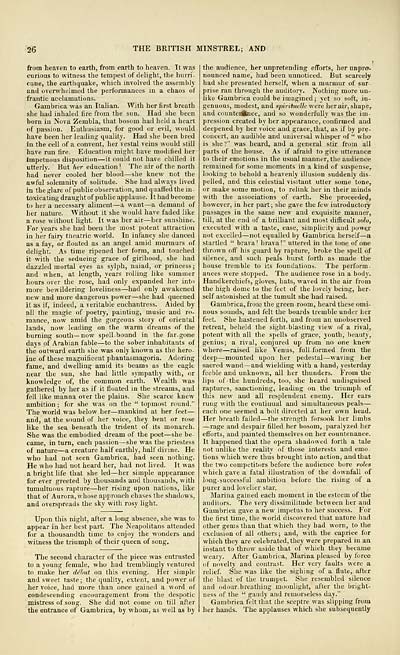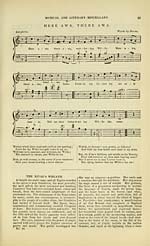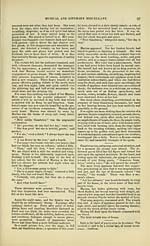Glen Collection of printed music > Printed music > British minstrel, and musical and literary miscellany
(364) Page 26
Download files
Complete book:
Individual page:
Thumbnail gallery: Grid view | List view

'26
THE BRITISH MINSTREL; AND
from heaven to earth, from earth to heaven. It was
curious to witness the tempest of delight, the hurri-
cane, the earthqualse, which involved the assembly
and overwhelmed the performances in a chaos of
frantic acclamations.
Gambrica was an Italian. With her first breath
she had inhaled lire from the sun. Had she been
born in Nova Zembla, that bosom had held a heart
of passion. Enthusiasm, for good or evil, would
have been her leading quality. Had she been bred
in the cell of a convent, her vestal veins would still
have run tire. Education might have modified her
impetuous disposition — it could not have chilled it
utterly. But her education ! The air of the north
had never cooled her blood — she knew not the
awful solemnity of solitude. She had always lived
in the glare of public observation, and quaffed the in-
toxicating draught of public applause. It had become
to her a necessary aliment — a want — a demand of
her nature. Without it she would have faded like
a rose without light. It was her air — her sunshine.
For years she had been the most potent attraction
in her fairy theatric world. In infancy she danced
as a fay, or floated as an angel amid murmurs of
delight. As time ripened her form, and touched
it with the seducing grace of girlhood, she had
dazzled mortal eyes as sylph, naiad, or princess;
and when, at length, years rolling like summer
hours over the rose, had only expanded her into
more bewildering loveliness — had only awakened
new and more dangerous power — she had queened
it as if, indeed, a veritable enchantress. Aided by
all the magic of poetry, painting, music and ro-
mance, now amid the gorgeous story of oriental
lands, now leading on the warm dreams of the
burning south— now spell-bound in the far-gone
days of Arabian fable — to the sober inhabitants of
the outward earth she was only known as the hero-
ine of these magnificent phantasmagoria. Adoring
fame, and dwelling amid its beams as the eagle
near the sun, she had little sympathy with, or
knowledge of, the common earth. Wealth was
gathered by her as if it floated in the streams, and
fell like manna over the plains. She scarce knew
ambition ; for she was on the " topmost round."
The world was below her — mankind at her feet —
and, at the sound of her voice, they bent or rose
like the sea beneath the trident of its monarch.
She was the embodied dream of the poet — she be-
came, in turn, each passion — she was the priestess
of nature — a creature half earthly, half divine. He
who had not seen Gambrica, had seen nothing.
He who had not heard her, had not lived. It was
a bright life that she led — her simple appearance
for ever greeted by thousands and thousands, with
tumultuous rapture — her rising upon iiations, like
that of Aurora, whose approach chases the shadows,
and overspreads the sky with rosy light.
Upon this night, after a long absence, she was to
appear in her best part. The Neapolitans attended
for a thousandth time to enjoy the wonders and
witness the triumph of their queen of song.
The second character of the piece was entrusted
to a young female, who had tremblingly ventured
to make her dibut on this evening. Her simple
and sweet taste ; the quality, extent, and power of
her voice, had more than once gained a word of
condescending encouragement from the despotic
mistress of song. She did not come on till after
the entrance of Gambrica, by whom, as well as by
the audience, her unpretending efforts, her unproi-
nounced name, had been unnoticed. But scarcely
had she presented herself, when a murmur of sur-
prise ran through the auditory. Nothing more un-
like Gambrica could be imagined; yet so soft, in-
genuous, modest, and spirituellc were her air, shape,
and countejbice, and so wonderfully was the im-
pression created by her appearance, confirmed and
deepened by her voice and grace, that, as if by pre-
concert, an audible and universal whisper of " who
is she?" was heard, and a general stir from all
parts of the house. As if afraid to give utterance
to their emotions in the usual manner, the audience
remained for some moments in a kind of suspense,
looking to behold a heavenly illusion suddenly dis-
pelled, and this celestial visitant utter some tone,
or make some motion, to relink her in their minds
with the associations of earth. Slie proceeded,
however, in her part ; she gave the few introductory
passages in the same new and exquisite manner,
till, at the end of a brilliant and most difficult solo,
executed with a taste, ease, simplicity and power
not excelled — not equalled by Gambrica herself — a
startled " brava! brava!" uttered in the tone of one
thrown off his guard by rapture, broke the spell of
silence, and such peals burst forth as made the
house tremble to its foundations. The perform-
ances were stopped. The audience rose in a body.
Handkerchiefs, gloves, hats, waved in the air from
the high dome to the feet of the lovely being, her-
self astonished at the tumult she had raised.
Gambrica, froro the greenroom, heard these omi-
nous sounds, and felt the boards tremble under her
feet. She hastened forth, and from an unobserved
retreat, beheld the sight-blasting view of a rival,
potent with all the spells of grace, youth, beauty,
genius; a rival, conjured up from no one knew
where — raised like Venus, full- formed from the
deep — mounted upon her pedestal — waving her
sacred wand — and wielding with a hand, yesterday
feeble and unknown, all her thunders. From the
lips of -the hundreds, too, she heard undisguised
raptures, sanctioning, leading on the triumph of
this new and all resplendent enemy. Her ears
rung with the continual and simultaneous peals —
each one seemed a bolt directed at her own head.
Her breath failed — the strength forsook her limbs
— rage and despair filled her bosom, paralyzed her
efforts, and painted themselves on her countenance.
It happened that the opera shadowed forth a tale
not unlike the reality of those interests and emo-
tions which were thus brought into action, and that
the two competitors before the audience bore roles
which gave a fatal illustration of the downfall of
long-successful ambition before the rising of a
purer and lovelier star.
Marina gained each moment in the esteem of the
auditors. The very dissimilitude between her and
Gambrica gave a new impetus to her success. For
the first time, the world discovered that nature had
other gems than that which they had worn, to the
exclusion of all others; and, with the caprice for
which they are celebrated, they were prepared in an
instant to throw aside that of which they became
weary. After Gambrica, Marina pleased by force
of novelty and contrast. Her very faults were a
relief. She was like the sighing of a flute, after
the blast of the trumpet. She resembled silence
and odour-breathing moonlight, after the bright-
ness of the " gaudy and remorseless day."
Gambrica felt that the sceptre was slipping from
lier hands. The applauses which she subsequently
THE BRITISH MINSTREL; AND
from heaven to earth, from earth to heaven. It was
curious to witness the tempest of delight, the hurri-
cane, the earthqualse, which involved the assembly
and overwhelmed the performances in a chaos of
frantic acclamations.
Gambrica was an Italian. With her first breath
she had inhaled lire from the sun. Had she been
born in Nova Zembla, that bosom had held a heart
of passion. Enthusiasm, for good or evil, would
have been her leading quality. Had she been bred
in the cell of a convent, her vestal veins would still
have run tire. Education might have modified her
impetuous disposition — it could not have chilled it
utterly. But her education ! The air of the north
had never cooled her blood — she knew not the
awful solemnity of solitude. She had always lived
in the glare of public observation, and quaffed the in-
toxicating draught of public applause. It had become
to her a necessary aliment — a want — a demand of
her nature. Without it she would have faded like
a rose without light. It was her air — her sunshine.
For years she had been the most potent attraction
in her fairy theatric world. In infancy she danced
as a fay, or floated as an angel amid murmurs of
delight. As time ripened her form, and touched
it with the seducing grace of girlhood, she had
dazzled mortal eyes as sylph, naiad, or princess;
and when, at length, years rolling like summer
hours over the rose, had only expanded her into
more bewildering loveliness — had only awakened
new and more dangerous power — she had queened
it as if, indeed, a veritable enchantress. Aided by
all the magic of poetry, painting, music and ro-
mance, now amid the gorgeous story of oriental
lands, now leading on the warm dreams of the
burning south— now spell-bound in the far-gone
days of Arabian fable — to the sober inhabitants of
the outward earth she was only known as the hero-
ine of these magnificent phantasmagoria. Adoring
fame, and dwelling amid its beams as the eagle
near the sun, she had little sympathy with, or
knowledge of, the common earth. Wealth was
gathered by her as if it floated in the streams, and
fell like manna over the plains. She scarce knew
ambition ; for she was on the " topmost round."
The world was below her — mankind at her feet —
and, at the sound of her voice, they bent or rose
like the sea beneath the trident of its monarch.
She was the embodied dream of the poet — she be-
came, in turn, each passion — she was the priestess
of nature — a creature half earthly, half divine. He
who had not seen Gambrica, had seen nothing.
He who had not heard her, had not lived. It was
a bright life that she led — her simple appearance
for ever greeted by thousands and thousands, with
tumultuous rapture — her rising upon iiations, like
that of Aurora, whose approach chases the shadows,
and overspreads the sky with rosy light.
Upon this night, after a long absence, she was to
appear in her best part. The Neapolitans attended
for a thousandth time to enjoy the wonders and
witness the triumph of their queen of song.
The second character of the piece was entrusted
to a young female, who had tremblingly ventured
to make her dibut on this evening. Her simple
and sweet taste ; the quality, extent, and power of
her voice, had more than once gained a word of
condescending encouragement from the despotic
mistress of song. She did not come on till after
the entrance of Gambrica, by whom, as well as by
the audience, her unpretending efforts, her unproi-
nounced name, had been unnoticed. But scarcely
had she presented herself, when a murmur of sur-
prise ran through the auditory. Nothing more un-
like Gambrica could be imagined; yet so soft, in-
genuous, modest, and spirituellc were her air, shape,
and countejbice, and so wonderfully was the im-
pression created by her appearance, confirmed and
deepened by her voice and grace, that, as if by pre-
concert, an audible and universal whisper of " who
is she?" was heard, and a general stir from all
parts of the house. As if afraid to give utterance
to their emotions in the usual manner, the audience
remained for some moments in a kind of suspense,
looking to behold a heavenly illusion suddenly dis-
pelled, and this celestial visitant utter some tone,
or make some motion, to relink her in their minds
with the associations of earth. Slie proceeded,
however, in her part ; she gave the few introductory
passages in the same new and exquisite manner,
till, at the end of a brilliant and most difficult solo,
executed with a taste, ease, simplicity and power
not excelled — not equalled by Gambrica herself — a
startled " brava! brava!" uttered in the tone of one
thrown off his guard by rapture, broke the spell of
silence, and such peals burst forth as made the
house tremble to its foundations. The perform-
ances were stopped. The audience rose in a body.
Handkerchiefs, gloves, hats, waved in the air from
the high dome to the feet of the lovely being, her-
self astonished at the tumult she had raised.
Gambrica, froro the greenroom, heard these omi-
nous sounds, and felt the boards tremble under her
feet. She hastened forth, and from an unobserved
retreat, beheld the sight-blasting view of a rival,
potent with all the spells of grace, youth, beauty,
genius; a rival, conjured up from no one knew
where — raised like Venus, full- formed from the
deep — mounted upon her pedestal — waving her
sacred wand — and wielding with a hand, yesterday
feeble and unknown, all her thunders. From the
lips of -the hundreds, too, she heard undisguised
raptures, sanctioning, leading on the triumph of
this new and all resplendent enemy. Her ears
rung with the continual and simultaneous peals —
each one seemed a bolt directed at her own head.
Her breath failed — the strength forsook her limbs
— rage and despair filled her bosom, paralyzed her
efforts, and painted themselves on her countenance.
It happened that the opera shadowed forth a tale
not unlike the reality of those interests and emo-
tions which were thus brought into action, and that
the two competitors before the audience bore roles
which gave a fatal illustration of the downfall of
long-successful ambition before the rising of a
purer and lovelier star.
Marina gained each moment in the esteem of the
auditors. The very dissimilitude between her and
Gambrica gave a new impetus to her success. For
the first time, the world discovered that nature had
other gems than that which they had worn, to the
exclusion of all others; and, with the caprice for
which they are celebrated, they were prepared in an
instant to throw aside that of which they became
weary. After Gambrica, Marina pleased by force
of novelty and contrast. Her very faults were a
relief. She was like the sighing of a flute, after
the blast of the trumpet. She resembled silence
and odour-breathing moonlight, after the bright-
ness of the " gaudy and remorseless day."
Gambrica felt that the sceptre was slipping from
lier hands. The applauses which she subsequently
Set display mode to: Large image | Transcription
Images and transcriptions on this page, including medium image downloads, may be used under the Creative Commons Attribution 4.0 International Licence unless otherwise stated. ![]()
| Special collections of printed music > Glen Collection of printed music > Printed music > British minstrel, and musical and literary miscellany > (364) Page 26 |
|---|
| Permanent URL | https://digital.nls.uk/91439313 |
|---|
| Description | Scottish songs and music of the 18th and early 19th centuries, including music for the Highland bagpipe. These are selected items from the collection of John Glen (1833 to 1904). Also includes a few manuscripts, some treatises, and other books on the subject. |
|---|
| Description | The Glen Collection and the Inglis Collection represent mainly 18th and 19th century Scottish music, including Scottish songs. The collections of Berlioz and Verdi collected by bibliographer Cecil Hopkinson contain contemporary and later editions of the works of the two composers Berlioz and Verdi. |
|---|

